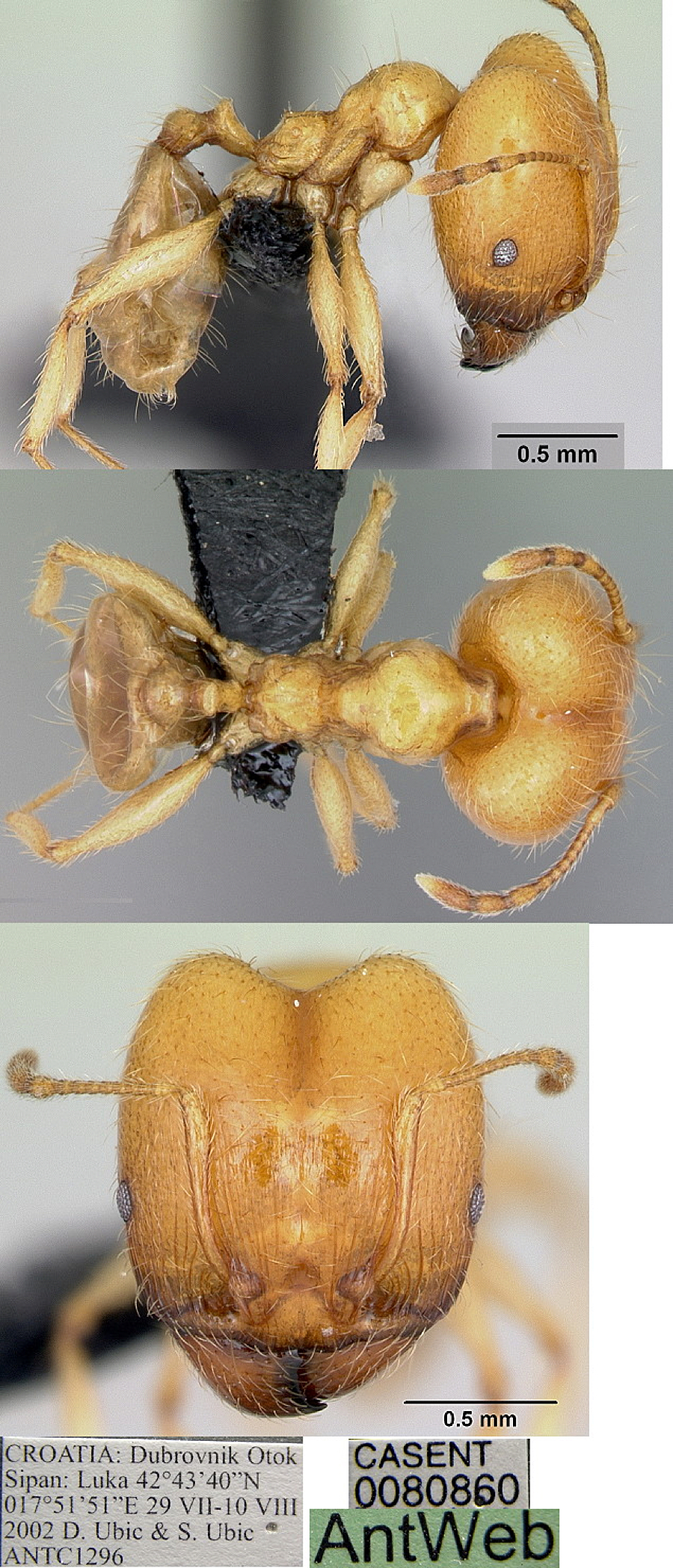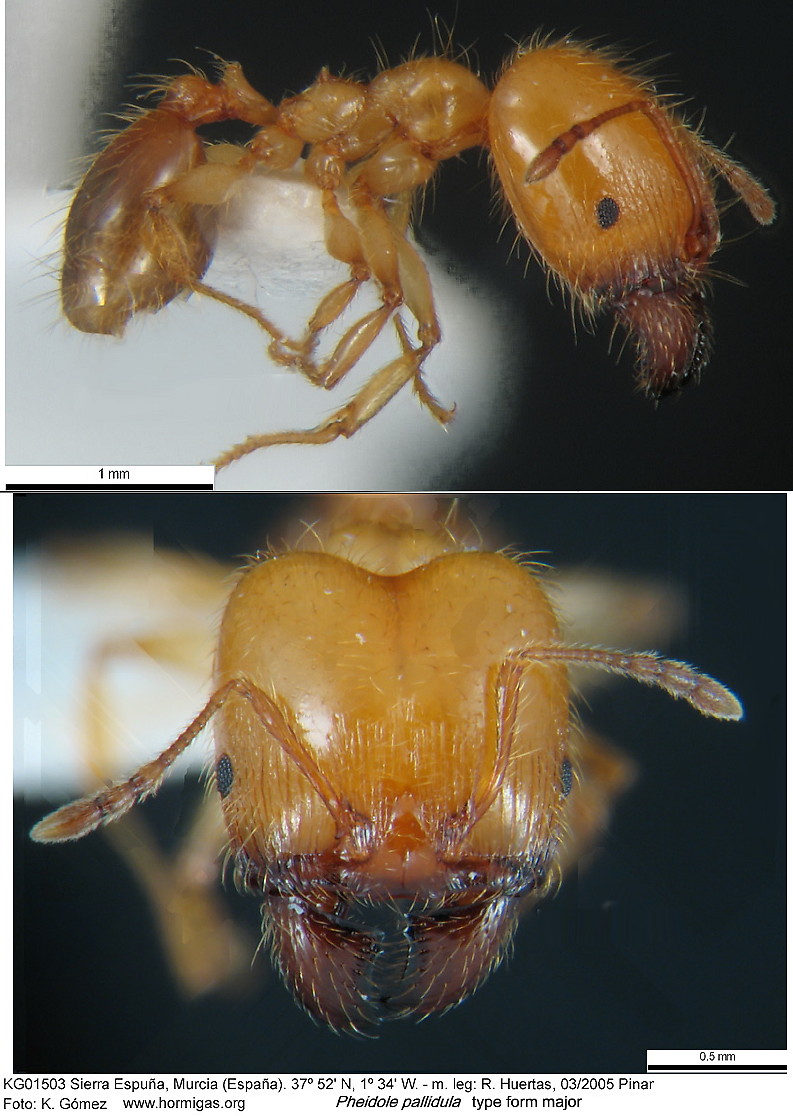Pheidole pallidula (Nylander) - majors

MAJOR - new description TL 3.4-3.9 mm; Spain
specimens (Gomez photographs) CI 100 SI 54 OI 13; Kaseh specimens CI 90
SI 58 OI 14
Head in full face view subrectangular or elongate cordate with a
moderately deeply impressed occiput
Mandibles small and relatively weak, wholly smooth other than for weak
striations on the outer base
Clypeus smooth and shiny with a very weak median longitudinal carina,
anterior margin sinuous but only weakly impressed medianly
Frontal carinae very short but very weakly divergent
Antennae with both scapes and funiculi slender and relatively long;
funiculus segments 2-7 all no longer than they are wide; apical segment
only 1.5 x longer than the penultimate segment
Eye small and weakly ovoid circular (9 facets long X 8 wide); set 1.6 X
its own length back from the lateral margin of the clypeus
Hypostoma with solely a pair of quite large lateral teeth; underside of
head smooth and shiny (confirmed for the Spanish specimens by K Gomez,
pers. commun.)
Alitrunk profile with a moderately domed pro-mesonotum; there is a
slightly raised area at the position of a transverse welt on the
mesonotum and a steeper area dropping into a very shallow metanotal
groove; from above the promesonotum has almost straight sides and has a
distinctly marked mesonotal area; the propodeum profile is very weakly
convex with very small triangular teeth; from above the propodeum
widens behind the metanotal groove, the upper edges are very weakly
marginate but there is no longitudinal impression, the propodeum dorsum
at the base of the teeth is 0.4 X the maximum width of the promesonotum
In profile, the petiole has a relatively short pedicel which thickens
from front to the base of the node; the node is narrow with the
posterior face vertical, the upper margin is sharply rounded and not
medially impressed
The postpetiole is small and globular; in profile ovoid with lateral
processes on the lower posterior margin; in dorsal view it is twice as
wide as it is long and the upper surface is evenly ovoid
The gaster is distinctly smaller than the head; from above it is an
elongated oval with straight sides; in profile it is a simple elongated
oval
The erect pilosity is quite long, fine and quite abundant but generally
suberect in such a way as to give the ant an untidy appearance;
pubescence short, adpressed and sparse
Generally shiny but with an opaque appearance; there is almost no
sculpturation other than the fine longitudinal striations on the
anterior one-third of the head
Overall colour pale yellow-brown, the mandibles are variably darker
brown; the gaster often has a pattern of ill-defined dark blotches
Gomez (pers.comm) has checked his collection of major workers from the
Iberian Peninsula and the Balearic Islands and finds all to have the
above arrangement of hypostomal teeth.
|
 The photomontage of
what appears to be a major of the type
form from Croatia is collated from http://www.antweb.org/specimen.do?name=casent0080860. The photomontage of
what appears to be a major of the type
form from Croatia is collated from http://www.antweb.org/specimen.do?name=casent0080860.
|
 The photomontage of what appears to be a good match for
the type form is collated from http://www.hormigas.org
which deals primarily with the ants of Spain. Others can be
seen at, e.g. http://photos.fourmis.free.fr/media/228/Pheidole_pallidula.jpg The photomontage of what appears to be a good match for
the type form is collated from http://www.hormigas.org
which deals primarily with the ants of Spain. Others can be
seen at, e.g. http://photos.fourmis.free.fr/media/228/Pheidole_pallidula.jpg
|
 The
photomontage is of what appears to be a
major of the type form from Egypt, Kaseh Tourist Village,
collected by Mostafa Sharaf, 7.viii.2007. It differs slightly from the
above in having somewhat bigger eyes and a longer head, i.e. matching
Emery (1915j) illustration and the Finzi (1936) description of recticeps,
with a longer head and dark oatches on the gaster. The
photomontage is of what appears to be a
major of the type form from Egypt, Kaseh Tourist Village,
collected by Mostafa Sharaf, 7.viii.2007. It differs slightly from the
above in having somewhat bigger eyes and a longer head, i.e. matching
Emery (1915j) illustration and the Finzi (1936) description of recticeps,
with a longer head and dark oatches on the gaster.
|
 The
photomontage is a major from Spain, Sant Celoni, Barcelona,
collected by Xavier Espadaler, 27.x.2008. The
photomontage is a major from Spain, Sant Celoni, Barcelona,
collected by Xavier Espadaler, 27.x.2008.
|
 The
photomontage is a major from Spain, Sant Celoni, Barcelona,
collected by Xavier Espadaler, 27.x.2008. The
photomontage is a major from Spain, Sant Celoni, Barcelona,
collected by Xavier Espadaler, 27.x.2008.
|
 The
photomontage is a major from Spain, Sant Celoni, Barcelona,
collected by Xavier Espadaler, 27.x.2008. The
photomontage is a major from Spain, Sant Celoni, Barcelona,
collected by Xavier Espadaler, 27.x.2008.
|
 The
photomontage is a major from Iran, Gogje Ghiaye Markasi,
collected by S Moradloo (03). The
photomontage is a major from Iran, Gogje Ghiaye Markasi,
collected by S Moradloo (03).
|
|